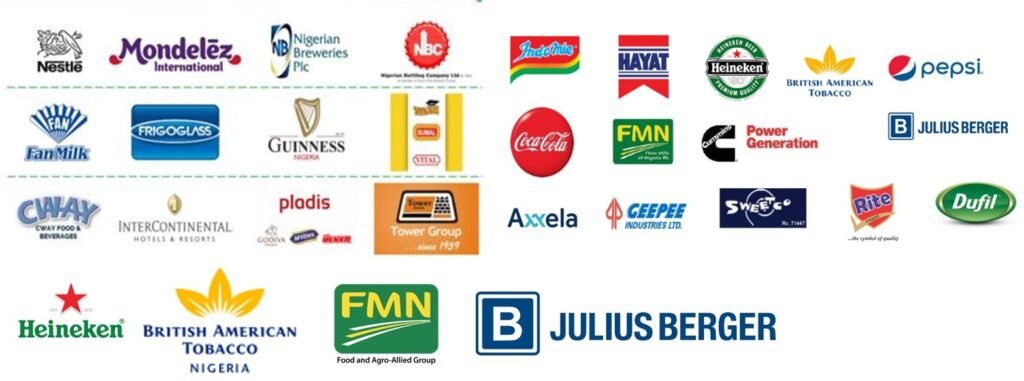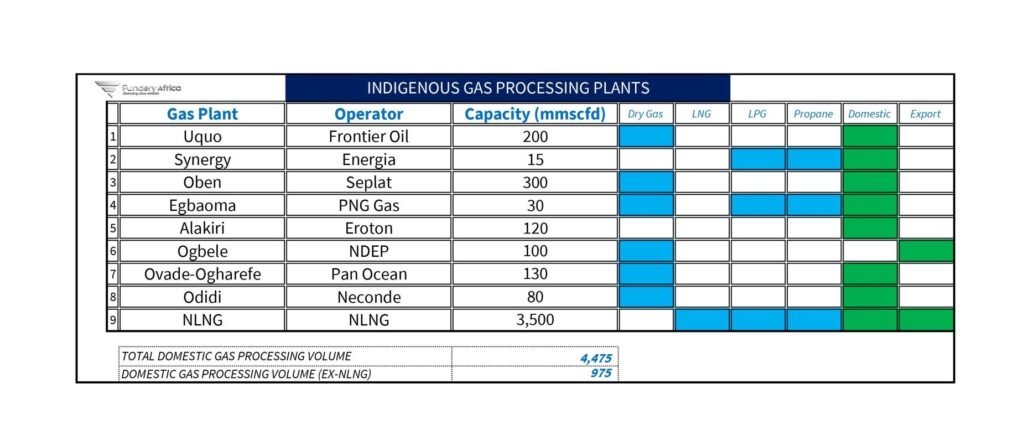Natural Gas is the earth’s cleanest-burning hydrocarbon. Its combustion neither produces ash residues nor Sulphur oxides and only releases negligible amounts of nitrogen.
This sets it apart from all the other fossil fuels allowing it to become the 2nd most used fuel in the world. Gas is projected to be the #1 fuel of choice for most economies before 2030.
Natural gas helps industrialization in several ways as it is found throughout the world either by itself or in association with crude oil.
Most of Nigeria’s gas in raw form is wet gas, and like crude oil, it needs to be refined in order to harness its full value. Gas is refined at processing plants using Fischer–Tropsch synthesis to strip off the heavy hydrocarbons to produce dry methane gas. This dry gas is the most ideal fuel for combustion engines due to its very high energy content and low GHG emissions. It is the fuel of choice for gas to power generation.
The heavy ends stripped off are blended and sold as the well-known and commercially valuable Natural Gas Liquids (NGLs) – ethane, propane, butane, isobutane and Liquefied Petroleum Gas (LPG).
These refined and compressed products can be transported by specialized refrigerated trucks (with temperatures as low as -200°C) to end-users and turned back to gaseous form to be used as fuel or feedstock.
With an abundant gas supply, the potential to provide reliable power can have a transformative impact on the economy, particularly in industrialization.
According to the International Gas Union (IGU), globally focused industries that have switched their fuel source to Natural Gas have enjoyed an average of about 30% energy cost savings and 70% higher productivity due to uninterrupted power underpinned by CNG/LPG/LNG.
Natural gas is a cleaner and cheaper fuel than petrol and diesel for power generation and is a key raw material in the production of:
- Urea & Ammonia Fertilizers
- Wax
- Industrial heat exchanger systems
- Kerosene & Diesel (under special conditions)
- Naphtha
- Light oils – propane, butane, n-pentane
Global Gas Market Outlook
The development of the gas industry is driven by end-user demand and the largest consumer markets. As of 2019, Asia – primarily driven by China – is the world’s largest natural gas consumer. Europe and North America also influence prices with their large gas consumer bases and temperate weather needs.
Market watchers observed a slowdown in the price of natural gas transactions prior to the Covid-19 pandemic. Reason: the shale gas boom, which resulted in a flood of US natural gas production to the global market that triggered a collapse in prices as recently as December 2019.
Thanks to Covid-19, Q1 2020 has seen unprecedented upheaval and disruption, not just to daily life, but also to energy and commodity markets — with no exception to the global gas market.
While the pandemic has wreaked havoc across jet fuel, gasoline, and diesel markets, the impact of Covid-19 on LPG — which is both an essential fuel and feedstock — has been somewhat different to other products.
The fall in LPG prices has not matched those across the barrel, with propane and butane rising relative to naphtha thanks to the changing supply and demand dynamics in road transport markets.
Gas Based Industrialization Examples
Casing the food industry
A company, Naturin, produces collagen casings for the food industry using natural gas as a fuel for one of the most modern collagen casing production lines in the world. A new gas pipeline was laid at the factory premises in Weinheim in Baden-Württemberg for just this purpose.
White Gold for the ceramic world
Ceramics and porcelain manufacturer KAHLA fire quality products at 1,400°C. As a versatile form of energy, natural gas plays a key role in industrial production. Complex manufacturing processes that require an exact amount of heat are barely possible without natural gas, as natural gas delivers constant heat in precisely the volume needed – and thus guarantees the quality of the products.
Essential in brick production
The Netherlands are a country of brick buildings. Each year, roughly 800 million bricks flow into construction projects to build apartment and office buildings or they are used as paving stones for gardens, roads or city squares. The average single-family home alone requires about 5,000 to 10,000 bricks. Most people don’t realize that making bricks would be almost impossible without natural gas.
Power and Manufacturing
Industries that have switched their fuel source to Natural Gas have enjoyed an average of about 30% energy cost savings and 70% higher productivity due to uninterrupted power underpinned by CNG/LPG/LNG. This increased output from industries leads to increased local manufacturing activities, GDP growth and export earning potential of the country.
Precise Natural Gas heating to make safer automotive parts
At the Volkswagen factory in Kassel, high-strength chassis parts are being manufactured using natural gas in the hot working of steel plates that are later used to form the car’s passenger compartment. Thanks to the extreme rigidity of the ultra-high-strength steel, the total weight of the chassis of the Golf VII, for instance, could be reduced by about 20kg. Considering the large spare parts and auto market in Nigeria, this may be a low hanging fruit for investors.
Aromatic whiskey distilled with Natural Gas
The finch® distillery has been producing what they call the “water of life” using natural gas since 1999. The distillation process heats the boiler with the required level of reliability and precision using natural gas, it makes a critical contribution to the high quality of the product.
Agriculture
Notore Chemical Industries in Onne utilizes natural gas supplied from adjacent gas fields to produce an estimated 300,000 tons of Ammonia fertilizers and 500,000 tons of Urea fertilizer annually. Aliko Dangote has announced the world’s biggest fertilizer plant located in Ibeju Lekki, Lagos Nigeria will begin full commercial production in May 2020. With a capacity of 3million tonnes per annum, the $2-billion Granulated Urea Fertiliser plant has been classified as the biggest project in the history of the fertilizer industry. (Business Day, 2020)
Natural Gas Fueling Manufacturers in Nigerian Industries

Nigeria is the 2nd biggest producer of gas in Africa and has the largest proven gas reserves in Africa, estimated to be more than 202 Trillion standard cubic feet (Tcf). Its robust demographic and macro-economic fundamentals support the growth outlook for gas demand due to its large emerging population with a potential household LPG consumption estimated at 3.4million MT per annum.
While gas flaring is still prevalent at 11% of production, there are concerted efforts by regulators to reduce this by focusing on stimulating domestic demand, levying flaring penalties, mandated domestic gas supply obligation, and support for domestic gas-to-power infrastructure.
Established gas exporter with robust export infrastructure– the NLNG alone processes 3.5Bcf per day of gas, the majority of which is exported to European, North American, and Asian markets.
The Federal Government’s drive to end gas flaring through the National Gas Policy (2017) and the Gas flare regulations introduced in 2018. These will create a potential market for at least 45 new gas projects coming onstream after 2020.
The clean and safe nature of LPG has driven its increasing adoption by both retail and industrial consumers. Lower greenhouse gas emissions make it safer for the environment and a better energy source compared to alternatives.
The Federal Government’s push to subsidize domestic gas via LPG usage is a key driver which will trigger an increase in expected household usage in the coming decade. This will have the effect of:
- Stimulating the multiplier effect of gas in the domestic economy;
- Positioning Nigeria competitively in high-value export markets; and
- Guaranteeing long-term energy security in the country
Organizations in the FMCG, Agriculture, and Banking sectors have transitioned to gas. Examples of such firms in the FMCG sector include British American Tobacco, Julius Berger, Flour Mills Nigeria, etc.
In the Agriculture sector, it’s an application that can be seen through the use of fertilizer, made with natural gas. It has led to higher-yield in farming which in turn increases food production and improves standard of living. Examples of firms in this sector include in Notore Industrial City.

With the coming bidding rounds of the NGFCP and Marginal Fields, there will be more gas processing plants coming on stream. A commercial bridge is needed to bring those volumes to market.
Emeka Iheme
